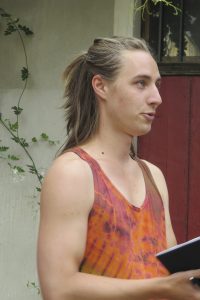
I Siesta Siciliensis
This is a poem about a siesta in the hot summer days of Sicily. It’s part experiment and practice in writing latin meter and part joke – the meter used is the Galliambici versus, as found in Catullus 63 about Attis. That poem is, as far as I know, the only surviving poem in this meter from antiquity, and it seems quite obvious that the rapidity and intensity of the meter is supposed to parallel the dancing and howling of the frenzied cults of Attis (Cybele/Magna Mater). The joke, then, is that I use this almost furious meter to describe a Sicilian siesta. Two things to note: in line 3 there is one too many short syllables, which is intended to strengthen the feeling of the bird quickly flying in the grove; the unnamed woman “ea” in line 10 is the Sicilian woman who sang Sicilian folksongs for us a couple of times during the week.
eho! venimus carentes metricisque Siciliam
sapientiis novisque, celeresque cecinimus,
velut alite cito volante lepide in nemore, pedes.
calidi dies et aurae feritate nuculeos
hederasque nunc perurunt, quoque nos nimiopere.
fruticeta (vel napaeas) movet alma viriditas,
et in arva volumus ire, in quibus umbra graciliter
tegit uvam, olivam, alaudam. modo carmina vetera
velut heri, mane, nocte, salimus ter alacriter,
ea cantat eloquenter itidemque vigilia.
sed enim diebus ardet super omne similiter
nimis aetheresque solque velut aestu in hominibus.
agimur sopore lente et ferimur simul in aquam
Somni dei exstillantem. cadimus et agit oculos.
Meter: Galliambics
Translation: Listen up! We came to Sicily, wanting knowledge, both metrical and new, and we sang quick feet, like when the bird flies quickly and elegantly through the grove. Hot days and winds now burn with ferocity the small nuts and the ivy, and they also burn us too much. The nourishing vegetation moves the bushes (or the valley nymphs), and we want to go to the fields, in which shadow slightlycovers the grape, the olive and the lark. Just now, like yesterday, in the morning and in the evening, we danced eagerly three times, and she sings lovely in the same way in the night. But, indeed, during the days in the same way the air and the sun burns over everything, as in humans in summer. We are driven slowly by sleepiness, and likewise we are carried to the dripping water of the god Somnus. We fall and he leads our eyes.
II Ad Versiculatores
This is a small goodbye poem addressed to the Versiculatores of the week. Nummarius (the small coin) is the Latin name of our magister in verse, Dr. David Money.
nunc ergo, amici mirificissimi,
nos fine facta spargimus omnia
Nummarius quae mente docta
nos docuit – sumus et poetae.
vos me velim visurum aliquo die
ac denuo gaudebimus optime
vino et cibo et carmen canendo
nempe erimus melior caterva!
Meter: Alcaic stanza
Translation: Now, then, most wonderful friends, when the end has been reached we spread out all that Nummarius with his learned mind has taught us – we too are poets.
I’d like to see you again some day and then again we will be very happy with wine and food, and when we recite poetry we will surely be the best gathering!